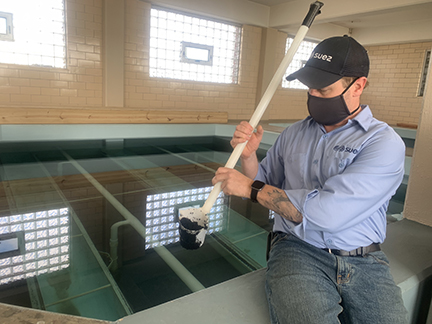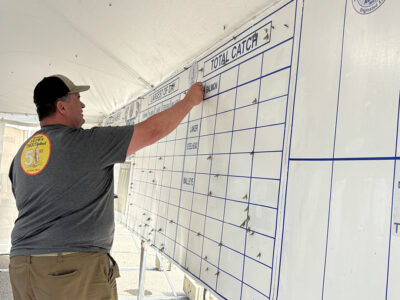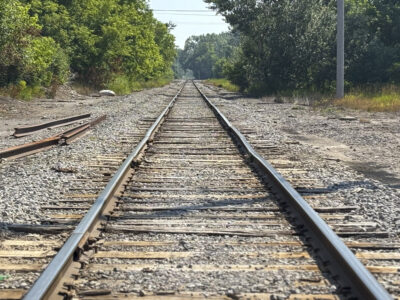Suez to conduct new tests for PFAS

News Photo by Steve Schulwitz Suez employee Mike Collins scoops out a cup of granular activated carbon that is used as a filter to protect the drinking water in Alpena from potentially harmful chemicals such as PFAS. The State is requiring Suez to test four locations where it is possible groundwater contaminated with PFAS could be entering the city’s sewer system. Suez Utility Manager Mike Glowinski said the state isn’t highly concerned about the slightly elevated amount of PFAS found in the plant’s biosolids, but wants to find the source of it and rectify it. The action is not related to any issues with the city’s drinking water.
ALPENA — A change in the operating permit by the Michigan Department of Environment, Great Lakes and Energy will require the City of Alpena’s utility contractor Suez, to test for Per- and polyfluoroalkyl substances, which is also known as PFAS.
The move was made after the state discovered an elevated amount of PFAS in biosolids.
The test recorded a reading of 36- parts per trillion, and although there isn’t a standard established by EGLE for biosolids, the state believes extra testing will help locate where the chemicals are coming into the system and correct the problem.
There is no impact on the safety of the municipal water and it is expected the PFAS is entering the sewage system through a cracked or broken pipe at or near one of several PFAS contaminated locations near Alpena.
Testing will be done at the Alpena Combat Readiness Training Center, where contamination was discovered four years ago, and also the site of the old tannery on Miller Street. Testing will take place twice a year at the intake and exit point at the water plant as well.
When the source of the contamination is found, correction action will be taken, Suez Utility Manager Mike Glowinski said.
“Right now it isn’t a large concern for EGLE,” Glowinski said. “But they want to make sure it doesn’t get worse and to make sure it isn’t getting into our collection system and into the plant itself.”
The city has a carbon filtration system that also works to protect the water supply from PFAS and other dangerous chemicals. Many plants are just now installing such systems, so Alpena is ahead of the game in terms of water protection.
Another concern of the state’s is the biosolids are used as fertilizers for non-human consumption crops. Glowinski said the state wants to make sure the crops and ground water remain safe.
Because of the added cost of the new testing, the Alpena Municipal Council voted to amend the contract with Suez, by adding the $4,400 to its worth.
PFAS has become an issue nationwide, and particularly at military bases, where firefighting foam was used for training or to extinguish fires. The state and federal government are working together to remediate the polluted sites, which include the CRTC, and the former Wurtsmith Air Force Base in Oscoda.
Recently, Gov. Gretchen Whitmer invoked a section of the 2020 National Defense Authorization Act that could force the Pentagon to meet the state’s new low PFAS standards while conducting cleanup at the former Wurtsmith Air Force Base and other military contamination sites.
Thus far, the military has balked at doing the clean-up to the level that would comply with Michigan’s strict PFAS regulations.
PFAS is found in many items, including personal care products such as cosmetics and lotions, insect repellants and sunscreens, pizza boxes and fast food wrappers.





